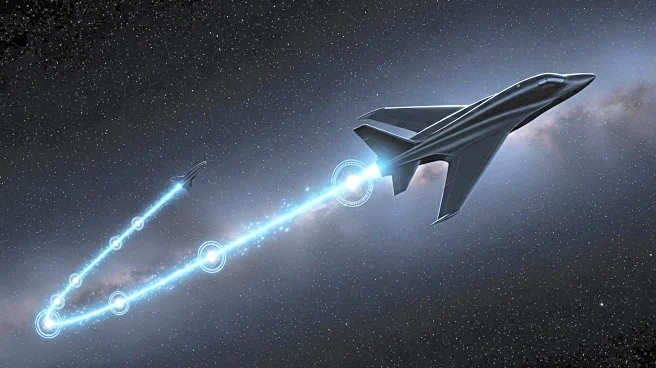What's Happening?
The X-37B, an American military spaceplane, is set to test a quantum inertial sensor as part of its eighth mission scheduled for August 21, 2025. This experiment aims to explore a potential replacement for GPS, which could revolutionize navigation for spacecraft, aircraft, ships, and submarines. The quantum inertial sensor utilizes atomic interferometry, where atoms are cooled to near absolute zero and placed in a state of superposition. This process creates an interference pattern that provides precise information about motion changes, such as acceleration or rotation. The technology promises greater sensitivity and accuracy compared to traditional inertial navigation systems, which rely on accelerometers and gyroscopes but suffer from drift over time.
Why It's Important?
The development of quantum navigation systems is crucial for environments where GPS signals are weak or unavailable, such as deep space, underwater, or conflict zones with signal jamming. This technology could become the primary navigation system for autonomous missions in space, enhancing resilience and precision. For military applications, it offers improved navigation in GPS-denied environments, while civilian sectors like aviation and maritime could benefit from reliable navigation where GPS is unreliable. The X-37B mission represents a significant step in moving quantum technology from theoretical research to practical aerospace applications, potentially transforming navigation across various industries.
What's Next?
The X-37B mission will be the first large-scale test of quantum inertial navigation in space, following previous experiments focused on atomic interferometry physics. Success in this mission could lead to broader adoption of quantum navigation systems in both military and civilian sectors. While the military nature of the mission may limit public access to results, its success could mark a historic milestone in space navigation, paving the way for future research and exploration. The technology is being actively developed in the U.S., China, and the UK, with previous successful tests on aircraft demonstrating its potential.
Beyond the Headlines
Quantum navigation systems could trigger long-term shifts in aerospace technology, offering a new paradigm for navigation that is immune to signal interference and drift. This advancement may also raise ethical and strategic considerations, particularly in military contexts where navigation resilience is critical. The integration of quantum technology into navigation systems could lead to new standards and protocols, influencing global aerospace and defense strategies.












